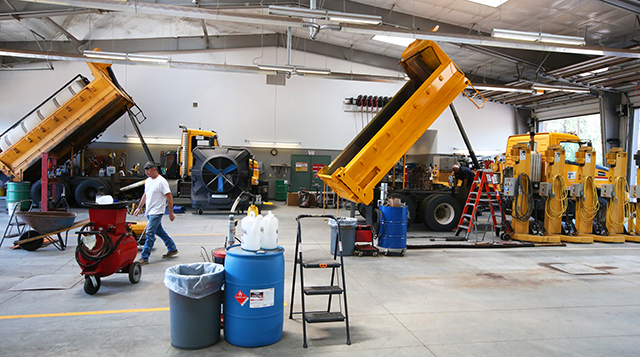Around the world
Published 12:00 am Monday, February 19, 2018
Survivors of school shooting lash out at Trump — Students who escaped the deadly school shooting in Florida focused their anger Sunday at President Donald Trump, contending that his response to the attack has been needlessly divisive. “You’re the president. You’re supposed to bring this nation together, not divide us,” said David Hogg, a 17-year-old student at Marjory Stoneman Douglas High School in South Florida, speaking on NBC’s “Meet the Press.” Hogg was responding to Trump’s tweet Saturday that Democrats hadn’t passed any gun control measures during the brief time they controlled Congress with a supermajority in the Senate. Trump also alluded to the FBI’s failure to act on tips that the suspect was dangerous, while bemoaning the bureau’s focus on Russia’s role in the 2016 election. Trump was at his Florida estate Sunday but did not mention the attack in a series of tweets. After more than a day of criticism from the students, the White House said the president would hold a “listening session” with students on Wednesday and meet with state and local security officials Thursday.
4 survivors of Grand Canyon crash critical — Authorities say four people who survived when a sightseeing helicopter crashed at the Grand Canyon earlier this month remain hospitalized in critical condition. Three British tourists were killed on Feb. 10 when the helicopter from Las Vegas went down on tribal land outside Grand Canyon National Park. The pilot and three other Britons were injured and taken to a Las Vegas trauma center. A spokesman for University Medical Center of Southern Nevada says the four survivors are still listed in critical condition as of Sunday. The National Transportation Safety Board is investigating the cause of the crash.
Trending
Iraqi victories fragile as U.S. reduces troops — From their outpost on Iraq’s westernmost edge, U.S. 1st Lt. Kyle Hagerty and his troops watched civilians trickle into the area after American and Iraqi forces drove out the Islamic State group. They were, he believed, families returning to liberated homes, a hopeful sign of increasing stability. But when he interviewed them on a recent reconnaissance patrol, he discovered he was wrong. They were families looking for shelter after being driven from their homes in a nearby town. Those who pushed them out were forces from among their “liberators” — Shiite militiamen who seized control of the area after defeating the IS militants. It was a bitter sign of the mixed legacy from the United States’ intervention in Iraq to help defeat the militants. American-backed military firepower brought down the IS “caliphate,” but many of the divisions and problems that helped fuel the extremists’ rise remain unresolved. The U.S.-led coalition, which launched its fight against IS in August 2014, is now reducing the numbers of American troops in Iraq, after Baghdad declared victory over the extremists in December. Both Iraqi and U.S. officials say the exact size of the drawdown has not yet been decided. U.S. and Iraqi commanders in western Iraq warn that victories over IS could be undercut easily by a large-scale withdrawal. Iraq’s regular military remains dependent on U.S. support. Many within Iraq’s minority communities view the U.S. presence as a buffer against the Shiite-dominated central government.
Museum to discuss if bones belong to pirate — Researchers are set to discuss their efforts to determine whether human bones recovered from a Cape Cod shipwreck are those of the infamous pirate Samuel “Black Sam” Bellamy. The Whydah Pirate Museum in Yarmouth, Massachusetts, says it also will publicly display the bones for the first time and showcase what they believe to be Bellamy’s pistol Monday. The objects were encased in a hardened mass of sand and stone pulled from the Whydah Gally shipwreck several years ago. The museum has enlisted forensic scientists to compare DNA from the bones to a sample given by one of Bellamy’s living descendants. The Whydah went down in stormy seas in 1717, killing most of its crew and leaving its treasure on the ocean floor. The wreck was discovered in 1984.
Facebook to verify ads with postcards — Facebook will soon rely on centuries-old technology to try to prevent foreign meddling in U.S. elections: the post office. Baffled in 2016 by Russian agents who bought ads to sway the U.S. presidential campaign, Facebook’s global politics and government outreach director, Katie Harbath, told a meeting of the National Association of Secretaries of State in Washington on Saturday that the company would send postcards to potential buyers of political ads to confirm they reside in the U.S. The recipient would then have to enter a code in Facebook to continue buying the ad. The method will first apply to ads that name candidates ahead of the midterm elections in November, said Facebook spokesman Andy Stone. The plan was unveiled a day after special counsel Robert Mueller charged 13 Russians with interfering in the presidential election. Mueller’s indictment described how Russian agents stole Social Security numbers and other information from real Americans and used them to create bank and PayPal accounts in order to buy online ads. Agents also recruited Americans to do things such as hold up signs at rallies organized to create content for Russian-created social media posts.








